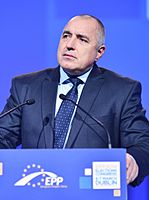Second Borisov Government facts for kids
Quick facts for kids Second Borisov Government |
|
|---|---|
91 Cabinet of Bulgaria |
|
 |
|
| Date formed | 7 November 2014 |
| Date dissolved | 27 January 2017 |
| People and organisations | |
| Head of state | Rosen Plevneliev |
| Head of government | Boyko Borisov |
| Deputy head of government |
See list
Rumyana Bachvarova (Coalition Policy and State Administration)
Tomislav Donchev (EU Funds and Economic Policy) Meglena Kuneva (European Policy and Institutional Issues) Zornitsa Rusinova (Demographic and Social Policy) |
| Member parties | GERB, Reformist Bloc (in coalition with GERB) and ABV (partnership agreement with GERB) until May 2016 |
| Status in legislature | Minority Coalition Government |
| History | |
| Election(s) | 2014 |
| Legislature term(s) | 43rd National Assembly |
| Incoming formation | Government formation |
| Predecessor | Bliznashki Government |
| Successor | Gerdzhikov Government |
The Second Borisov Government was the 91st government of Bulgaria. It started its work on November 7, 2014. This government was a group of political parties working together, led by Boyko Borisov.
The government was formed after Borisov's party, called GERB, won the election in 2014. Even though GERB won the most seats (84 out of 240) in the National Assembly (which is like Bulgaria's parliament), they didn't win enough to govern alone. So, they had to team up with other parties to form a government.
Contents
How the Government Was Formed
After the election, President Rosen Plevneliev asked Boyko Borisov to form a new government. Borisov's GERB party joined forces with the Reformist Bloc. They also got support from the Alternative for Bulgarian Revival (ABV) and the Patriotic Front.
The new government had twenty ministers. These ministers were approved by a vote of 136 to 97 in the National Assembly. Then, Boyko Borisov was chosen as the Prime Minister by an even bigger vote of 149 to 85. This made Borisov the first person in recent Bulgarian history to be elected Prime Minister twice.
The ministers who were part of the Reformist Bloc came from different parties. These included Democrats for a Strong Bulgaria, Union of Democratic Forces, Bulgaria for Citizens Movement, and Bulgarian Agrarian National Union.
Who Was in the Cabinet
The cabinet is the group of top ministers who help the Prime Minister run the country. Here are the main people who were part of the Second Borisov Government:
| Ministry | Minister | Party |
|---|---|---|
| Prime Minister | Boyko Borisov | GERB |
| Deputy Prime Minister in charge of coalition policy and state administration and Minister of Interior | Rumyana Bachvarova | GERB |
| Deputy Prime Minister in charge of absorption of EU funds and economic policy | Tomislav Donchev | GERB |
| Deputy Prime Minister in charge of EU policies and institutional matters | Meglena Kuneva | RB |
| Deputy Prime Minister and Minister of Labor and Social Policy | Zornitsa Rusinova | Independent |
| Minister of Justice | Ekaterina Zakharieva | RB |
| Minister of Foreign Affairs | Daniel Mitov | RB |
| Minister of Finance | Vladislav Goranov | GERB |
| Minister of Economy | Bozhidar Lukarski | RB |
| Minister of Energy | Temenuzhka Petkova | GERB |
| Minister of Tourism | Nikolina Angelkova | GERB |
| Minister of Education and Science | Todor Tanev | RB |
| Minister of Defence | Nikolay Nenchev | RB |
| Minister of Agriculture and Food | Desislava Taneva | GERB |
| Minister of Transport, Information Technology and Communications | Ivaylo Moskovski | GERB |
| Minister of Environment and Water | Ivelina Vasileva | GERB |
| Minister of Health | Petar Moskov | RB |
| Minister of Culture | Vezhdi Rashidov | GERB |
| Minister of Youth and Sports | Krasen Kralev | GERB |
Changes in the Cabinet
During its time, some ministers in the government changed.
Minister of Interior Resigns
On March 4, 2015, the Minister of Interior, Veselin Vuchkov, left his job. He said he resigned because Prime Minister Borisov did not want to replace some important officials in the ministry. A week later, on March 11, Rumyana Bachvarova took over as the new Minister of Interior. She also continued to be a Deputy Prime Minister.
Minister of Justice Resigns
On December 9, 2015, the Minister of Justice, Hristo Ivanov, also resigned. He said that the National Assembly had changed his plans for improving the court system. He felt these changes made the reforms less effective.
After his resignation, some people in Sofia held protests. They were unhappy that the court system reforms were not fully happening. On December 18, 2015, Ekaterina Zakharieva became the new Minister of Justice.
Minister of Education Resigns
On January 28, 2016, Prime Minister Borisov asked the Minister of Education and Science, Todor Tanev, to resign. A few days later, on February 3, Meglena Kuneva was appointed as the new minister. She also remained a Deputy Prime Minister.
ABV Party Leaves the Government
On May 10, 2016, Ivaylo Kalfin resigned from his roles as Deputy Prime Minister and Minister of Labor and Social Policy. At the same time, the Alternative for Bulgarian Revival (ABV) party decided to leave the government coalition.
Why the Government Resigned
On November 13, 2016, the GERB party's candidate, Tsetska Tsacheva, lost the presidential elections to Rumen Radev. After this loss, Prime Minister Borisov announced that his government would resign.
The National Assembly approved the government's resignation on November 16, 2016. The vote was 218 in favor and 0 against, with 2 members not voting.
 | DeHart Hubbard |
 | Wilma Rudolph |
 | Jesse Owens |
 | Jackie Joyner-Kersee |
 | Major Taylor |

